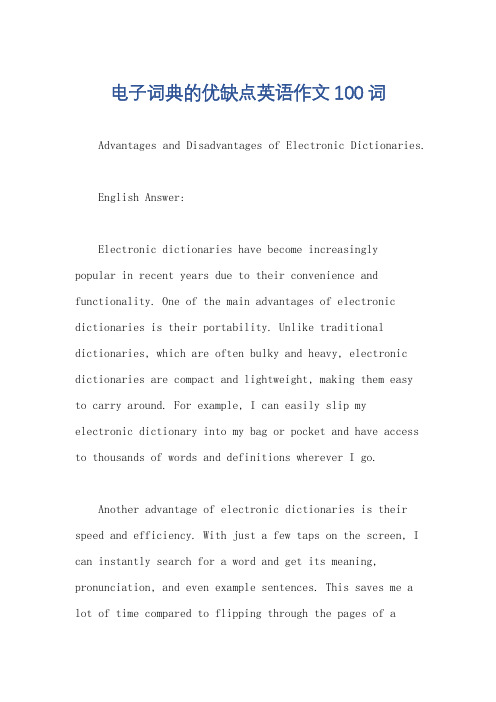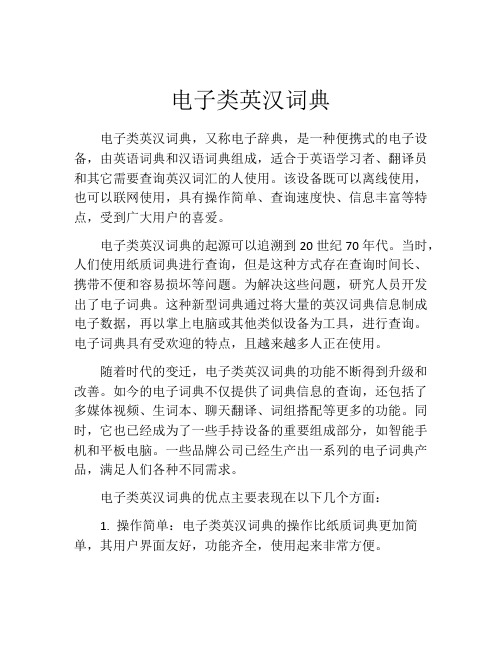电子词典的优势和劣势
电子词典的优点和缺点专四作文

电子词典的优点和缺点专四作文Electronic dictionaries have become a popular tool for language learners and individuals seeking quick access to definitions, translations, and language resources. They offer several advantages, such as convenience, portability, and a wide range of features. One of the main benefits of electronic dictionaries is their compact size, allowing users to carry them anywhere and access information on the go. They also offer multimedia features, such as audio pronunciation and example sentences, enhancing the learning experience. Additionally, electronic dictionaries often come with built-in search functions, making it easy to find specific words or phrases quickly.However, electronic dictionaries also have some drawbacks. One of the main disadvantages is their dependency on battery power, which can be a limitation when the battery runs out. Additionally, some users may find it challenging to navigate the interface or input text efficiently, leading to delays in accessing information. Furthermore, electronic dictionaries may not always provide accurate or comprehensive definitions, especially for specialized or technical terms.In conclusion, electronic dictionaries offer convenience and a wealth of features for language learners and individuals seeking quick access to language resources. While they have some limitations, such as battery dependency and potential inaccuracies, their benefits often outweigh the drawbacks, making them a valuable tool for enhancing language learning and communication.中文翻译:电子词典已成为语言学习者和需要快速查找定义、翻译和语言资源的个人的热门工具。
电子词典的优缺点英语作文100词

电子词典的优缺点英语作文100词Advantages and Disadvantages of Electronic Dictionaries.English Answer:Electronic dictionaries have become increasinglypopular in recent years due to their convenience and functionality. One of the main advantages of electronic dictionaries is their portability. Unlike traditional dictionaries, which are often bulky and heavy, electronic dictionaries are compact and lightweight, making them easyto carry around. For example, I can easily slip myelectronic dictionary into my bag or pocket and have access to thousands of words and definitions wherever I go.Another advantage of electronic dictionaries is their speed and efficiency. With just a few taps on the screen, I can instantly search for a word and get its meaning, pronunciation, and even example sentences. This saves me a lot of time compared to flipping through the pages of atraditional dictionary. Moreover, electronic dictionaries often come with additional features such as language translators, grammar guides, and vocabulary quizzes, which further enhance their usefulness.However, electronic dictionaries also have some drawbacks. One of the main disadvantages is their reliance on batteries or charging. If the battery runs out or the device is not charged, the dictionary becomes useless. This can be quite inconvenient, especially when I need to look up a word urgently. Additionally, electronic dictionaries may not provide as much detailed information as traditional dictionaries. While they offer quick and concise definitions, they may lack the in-depth explanations and examples found in printed dictionaries.In conclusion, electronic dictionaries offer portability, speed, and additional features, making them a convenient tool for language learners. However, their reliance on batteries and potential lack of detailed information are some of the drawbacks to consider.中文回答:电子词典近年来因其便捷性和功能性而越来越受欢迎。
查词典的三种方法

查词典的三种方法在研究中,经常会遇到不熟悉的单词或生词。
为了更好地理解和记忆这些词汇,我们可以使用词典进行查询。
本文将介绍三种常用的查词典的方法。
1. 纸质词典纸质词典是最传统的查词典方式之一。
它通常以书本形式出现,将各种词汇按字母顺序排列,并提供词语的解释、例句以及其他相关信息。
使用纸质词典查询单词时,我们可以根据单词的首字母快速翻到相应的页面,并阅读解释来了解其含义和用法。
纸质词典的优点是可以离线使用,不受网络限制,并且具有较为全面和详细的内容。
然而,它的劣势在于体积庞大,不便携带,并且更新速度相对较慢。
2. 电子词典随着科技的发展,电子词典成为了另一种便捷的查词典方式。
电子词典通常以小型设备或手机应用的形式存在,用户可以在电子词典上输入要查询的单词,然后即可得到相应的释义和其他信息。
电子词典的优点是便携,可以随时随地进行查询,并且往往具备快速搜索、发音和例句等功能。
此外,一些电子词典还支持离线使用,可以提供更好的使用体验。
然而,与纸质词典相比,电子词典可能内容相对较简洁,不如纸质词典全面。
3. 在线词典随着互联网的普及,在线词典也成为了一种广泛使用的查词典方式。
在线词典通常是通过浏览器或手机应用访问的网站,用户可以在搜索框中输入要查询的单词,然后即可获得相关的释义和其他信息。
在线词典的优点是内容较为丰富,能够及时更新,并且往往提供更多的例句和用法说明。
此外,一些在线词典还提供单词发音、同义词、反义词等附加功能,使得查询更为便捷。
然而,在线词典需要依赖网络连接,当网络不稳定或无法连接时,查询效果可能不如纸质词典或电子词典。
总结来说,查词典是研究中的常用技巧之一。
在选择查词典的方法时,我们可以根据自己的需求和实际情况,选择纸质词典、电子词典或在线词典进行查询。
无论哪种方法,都可以帮助我们更好地理解和记忆不熟悉的单词,提升研究效果。
电子类英汉词典

电子类英汉词典电子类英汉词典,又称电子辞典,是一种便携式的电子设备,由英语词典和汉语词典组成,适合于英语学习者、翻译员和其它需要查询英汉词汇的人使用。
该设备既可以离线使用,也可以联网使用,具有操作简单、查询速度快、信息丰富等特点,受到广大用户的喜爱。
电子类英汉词典的起源可以追溯到20世纪70年代。
当时,人们使用纸质词典进行查询,但是这种方式存在查询时间长、携带不便和容易损坏等问题。
为解决这些问题,研究人员开发出了电子词典。
这种新型词典通过将大量的英汉词典信息制成电子数据,再以掌上电脑或其他类似设备为工具,进行查询。
电子词典具有受欢迎的特点,且越来越多人正在使用。
随着时代的变迁,电子类英汉词典的功能不断得到升级和改善。
如今的电子词典不仅提供了词典信息的查询,还包括了多媒体视频、生词本、聊天翻译、词组搭配等更多的功能。
同时,它也已经成为了一些手持设备的重要组成部分,如智能手机和平板电脑。
一些品牌公司已经生产出一系列的电子词典产品,满足人们各种不同需求。
电子类英汉词典的优点主要表现在以下几个方面:1. 操作简单:电子类英汉词典的操作比纸质词典更加简单,其用户界面友好,功能齐全,使用起来非常方便。
2. 查询速度快:电子类英汉词典的数据储存是以电子方式完成的,它可以在短时间内为用户提供准确的搜索结果,速度快且精准。
3. 信息丰富:电子类英汉词典提供了丰富的信息,包括高质量的音频发音、详细的词语解释、例句等,为学习和理解英语语言提供了很大的帮助。
4. 易于携带:相比于纸质词典,电子类英汉词典的体积更小,重量更轻,易于携带,可以随身携带出行。
电子类英汉词典的缺点主要表现在以下几个方面:1. 价格较高:与纸质词典相比,电子类英汉词典的价格有些高昂,有些人可能会觉得不值得购买。
2. 依赖电源:电子类英汉词典必须依赖电源运转,如果没有电源或者电量用尽,就无法正常使用。
3. 不适合眼睛疲劳者:因为电子类英汉词典屏幕的特性,使用时间过长可能会造成眼睛疲劳或不适,对于长时间使用英汉词典的用户,应该注意保持用眼卫生。
电子词典的优点和缺点专四作文

电子词典的优点和缺点专四作文
《电子词典的那些事儿》
哎呀呀,咱今儿就来说说电子词典这玩意儿。
说起来电子词典的优点还真不少呢。
就像那次我在图书馆里查单词,碰见一个特别生僻的词,要是去翻那厚厚的纸质词典,还不知道得费多大功夫,我拿起电子词典一查,嘿,立马就出来了,多方便呀!而且电子词典携带起来也轻巧呀,不管走到哪,都能随时拿出来用用,可方便了。
但它也不是完美的啦。
有一回我着急用,结果它没电了,哎呀,把我给急得哟,这关键时刻掉链子呀!而且有时候操作起来还会有点小卡顿,感觉就像它在那“思考人生”一样,让人有点哭笑不得。
不过总的来说呢,电子词典还是给我们的学习和生活带来了很多便利。
虽然有那么一点小缺点,但谁还没点小毛病呀,咱还是得肯定它的作用。
咱可不能因为那点小小的不足,就否定了它的好呀。
在学习的道路上,电子词典还是能给咱不少帮助滴!希望未来电子词典能越来越好用,让我们用得更舒心啦!。
电子辞典的优点和缺点英语作文

电子辞典的优点和缺点英语作文English: Electronic dictionaries have both advantages and disadvantages. One of the main advantages of electronic dictionaries is their portability and convenience. Users can access a wide range of information quickly and easily, without having to carry around a bulky book. Electronic dictionaries also often have additional features such as pronunciation guides, grammar references, and interactive exercises, which can be helpful for language learners. However, one major disadvantage is that electronic dictionaries rely on battery power, meaning that they can run out of charge at inconvenient times. Additionally, the screens on electronic dictionaries can sometimes be small and difficult to read, especially in low light conditions. Some users also find it difficult to navigate the menus and find the information they need quickly. Despite these drawbacks, electronic dictionaries can still be a valuable tool for those looking for quick and convenient access to language information.中文翻译: 电子词典既有优点又有缺点。
电子词典的好处与坏处英语作文
电子词典的好处与坏处英语作文【中英文版】**The Advantages and Disadvantages of Electronic Dictionaries**In the digital age, electronic dictionaries have become an indispensable tool for many language learners.These compact devices offer a plethora of benefits; however, they also come with their fair share of drawbacks.This essay aims to explore both the advantages and disadvantages of using electronic dictionaries.The benefits of electronic dictionaries are manifold.Firstly, they are incredibly convenient.Unlike traditional paper dictionaries, which can be bulky and heavy, electronic dictionaries are lightweight and portable, making them ideal for on-the-go learning.Additionally, they offer vast storage capacity, allowing users to access numerous dictionaries and reference materials all in one device.This not only saves physical space but also provides a diverse range of resources for learners.Secondly, electronic dictionaries often come with helpful features such as audio pronunciation, which can aid in improving one"s speaking and listening skills.The search function is typically fast and efficient, enabling users to find the meanings of words and phrases quickly.Moreover, many electronic dictionaries have a built-in thesaurus, which can be invaluable for enhancing one"s vocabulary and writing skills.However, electronic dictionaries are not without their faults.Onemajor drawback is their dependency on battery life.Once the battery runs out, the dictionary becomes unusable, which can be problematic if there is no immediate access to a power source.Furthermore, electronic devices can be susceptible to damage or malfunction, potentially resulting in the loss of valuable data.Another disadvantage is the potential for distraction.Electronic dictionaries often have additional features such as games, internet access, or social media applications, which can divert the user"s attention from their studies.Moreover, some argue that the ease of use might lead to over-reliance, resulting in a lack of effort in committing words to memory.Lastly, electronic dictionaries may not always provide the depth of information that traditional dictionaries offer.While they are excellent for quick look-ups, they might lack detailed etymologies, usage examples, or the nuanced explanations that can be found in print dictionaries.In conclusion, electronic dictionaries offer a multitude of benefits, including convenience, efficiency, and a wide range of resources.However, they also have their downsides, such as battery dependency, potential distractions, and a lack of in-depth information.As with any tool, the key is to use electronic dictionaries judiciously and complement them with other learning resources.**电子词典的好处与坏处**在数字化时代,电子词典已成为许多语言学习者不可或缺的工具。
电子词典的优缺点
电子词典的优缺点电子词典的优点1、小巧轻便与传统的纸质词典相比较,电子词典最直观的优点便是小巧轻便、便于携带。
电子词典的主要部件包括一个LCD 、26个字母的输入键盘、电池仓、耳机及USB 插孔。
通常是巴掌大小,拇指厚度,重量在500克左右,随身携带装在口袋里都不成问题。
2、查阅快速对广大学生来说,电子词典的查阅速度要快于纸质词典。
查阅电子词典时,使用者只需利用键盘输入单词即可查到相应词条。
例如,要在电子词典上查阅“apple”这个单词,只需输入“A”、“P”、“P”、“L”、“E”五个字母,就能得到解释。
3、发音功能电子词典作为当代科技进步的产物,具有纸质词典所没有的发音功能,而发音对语言学习者十分重要。
电子词典的发音功能可以帮助学生通过听和模仿,更直接、更快速地学习和掌握发音技巧。
4、内容丰富现在的电子词典里不仅有英汉双解、汉英、同反义词、习语、搭配等英语词典,有些电子词典还收录有大英百科全书、日语词典、新华字典、汉语大词典、成语词典、古汉语常用词词典等多种词典。
学生利用电子词典可以轻松快捷地查阅很多知识和资料。
电子词典的缺点1、词条数量少电子词典收入的词条数量少于纸质词典。
考虑到内存有限,电子词典的设计者和生产商在录入词典时,会去掉一些不常见、不重要的词条,比如一些含有特殊文化含义的词、拟声词、词组等。
2、单词释义少电子词典中的单词释义内容少于纸质词典,这是电子词典最让人头疼的问题。
纸质词典对单词的解释力求言简意赅。
而电子词典能做到言简,却不能保证意赅。
目前,市场上流行的电子词典往往仅用一到两个近义词对单词做出解释,然后给出中文意思(通常比它们给出的英文释义还要简短的多),删掉了能帮助人们更准确、更全面地了解单词的释义部分。
3、收入不规范词典在一般的电子词典中,很少有收入《新时代汉英大词典》或《新世纪汉英大词典》这样的权威汉英词典的。
可能由于知识产权问题,有些电子词典中录入的汉英词典水平不很高、缺乏权威性,有的电子词典甚至录入的是来路不明的词典。
英语学习词典使用研究综述
英语学习词典使用研究综述引言:英语学习词典是英语学习者不可或缺的工具之一。
它可以帮助学习者查找单词的含义、用法、拼写和发音等信息。
随着网络和移动设备的普及,电子词典也变得越来越受欢迎。
本文将对英语学习词典的使用研究进行综述,分析其优势和不足,并提出进一步的研究方向。
优势:1. 便捷性:英语学习词典的电子版本可以随时随地使用,不需要携带厚重的纸质词典。
学习者可以通过手机、平板电脑或电脑进行查询,节省了查词的时间和精力。
2. 多样性:英语学习词典涵盖了丰富的词汇和用法,可以满足不同学习者的需求。
一些高级词典还提供了例句、同义词、反义词和语法说明等额外信息,帮助学习者更好地理解单词的用法和语境。
3. 个性化:电子词典可以根据学习者的需求进行个性化设置,比如调整字体大小、选择语音发音和添加自定义单词等。
学习者可以根据自己的喜好和学习进度进行设置,提高了学习效果。
不足:1. 依赖性:使用电子词典的学习者往往更加依赖于词典,难以培养自主学习的能力。
他们倾向于直接查询词典而不尝试通过上下文和联想来理解单词的意思。
这可能导致他们无法在实际交流中灵活运用所学的词汇。
2. 信息过载:电子词典提供的信息通常比纸质词典更多,但这也给学习者带来了信息过载的问题。
学习者可能会困惑于词典中复杂的解释和用法说明,而且很容易迷失在大量的例句和语法解释中,影响了学习的效果。
3. 学习策略:电子词典的使用过程中缺乏相关的学习策略指导。
学习者需要自己探索和总结有效的词典使用方法,包括如何选择例句、如何记忆单词和如何进行联想等。
缺乏指导可能会降低学习者的学习效果。
研究方向:1. 词典使用策略研究:研究者可以探索学习者在使用英语学习词典时采用的不同策略,并分析其对学习效果的影响。
研究学习者在查询单词时是首先查看释义还是例句,以及他们如何利用词典中的信息来理解和记忆单词。
2. 电子词典设计改进:研究者可以研究学习者对电子词典的需求和偏好,设计更加用户友好的界面和功能。
电子词典和纸质词典的利弊英语作文
电子词典和纸质词典的利弊英语作文English Answer:Electronic Dictionaries vs. Paper Dictionaries: Pros and Cons.Electronic dictionaries and paper dictionaries are both valuable tools for language learning, but they have their own unique advantages and disadvantages.Advantages of Electronic Dictionaries.Portability: Electronic dictionaries are small and lightweight, making them easy to carry around. This is a major advantage over paper dictionaries, which can be bulky and heavy.Multifunctionality: Electronic dictionaries can do more than just translate words. They can also provide definitions, synonyms, antonyms, and other grammaticalinformation. Some electronic dictionaries even include features such as text-to-speech and handwriting recognition.Up-to-date: Electronic dictionaries are updated regularly, so they always contain the latest words and definitions. This is not always the case with paper dictionaries, which can become outdated over time.Searchability: Electronic dictionaries make it easy to find the words you're looking for. You can simply type in a word or phrase, and the dictionary will instantly displaythe results. This is much faster and more convenient than flipping through a paper dictionary.Disadvantages of Electronic Dictionaries.Cost: Electronic dictionaries can be expensive, especially if you want a high-quality model.Battery life: Electronic dictionaries requirebatteries to operate, so you need to make sure to keep them charged.Screen glare: The screens on electronic dictionaries can be difficult to read in bright sunlight.Durability: Electronic dictionaries are not as durable as paper dictionaries. They can be easily damaged if they are dropped or exposed to water.Advantages of Paper Dictionaries.Low cost: Paper dictionaries are relatively inexpensive, especially if you buy a used copy.Durability: Paper dictionaries are very durable. They can withstand being dropped, folded, or even getting wet.Tactile feedback: Paper dictionaries provide a tactile feedback that can be helpful for learning. You can feel the pages as you flip through them, and you can mark words with a pen or highlighter.No distractions: Paper dictionaries do not have any ofthe distractions that electronic dictionaries have, such as buttons, lights, or screens. This can make it easier to focus on your work.Disadvantages of Paper Dictionaries.Bulkiness: Paper dictionaries can be bulky and heavy, making them difficult to carry around.Limited functionality: Paper dictionaries can only provide a limited amount of information. They do not include features such as text-to-speech or handwriting recognition.Out-of-date: Paper dictionaries can become outdated over time, as new words and definitions are added to the language.Difficult to search: Paper dictionaries can bedifficult to search, especially if you don't know how to spell the word you're looking for.Conclusion.Both electronic dictionaries and paper dictionaries have their own unique advantages and disadvantages. The best choice for you will depend on your individual needs and preferences. If you need a portable, multifunctional, and up-to-date dictionary, then an electronic dictionary is a good option. If you prefer a low-cost, durable, and tactile dictionary, then a paper dictionary is a better choice.中文回答:电子词典和纸质词典的利弊。
- 1、下载文档前请自行甄别文档内容的完整性,平台不提供额外的编辑、内容补充、找答案等附加服务。
- 2、"仅部分预览"的文档,不可在线预览部分如存在完整性等问题,可反馈申请退款(可完整预览的文档不适用该条件!)。
- 3、如文档侵犯您的权益,请联系客服反馈,我们会尽快为您处理(人工客服工作时间:9:00-18:30)。
电子词典的优势和劣势
Outline:
In the past decade,the market for… has burgeoned, as advances in technology have fueled growing demand among students and other consumers. Today,these … continue to become increasingly … Although… may have some minor disadvantages,these are heavily outweighed by a host of impressive advantages.
The advantages of… are many and varied. First,... Second,…Third,… Fourth,... Finally,… For instance,…In addition,if users …,they can …
Admittedly,… are not without disadvantages. Chief among these is ... Despite the fact that …,… are still… Another disadvantage of… is that …
As tens of millions of … users in China would agree, any limitations or downsides of … are offset by thei r numerous advantages. With ongoing technological advancements, coupled with …, students and others will have even more reason to put … on their shopping list.
Advantages:
portable devices
sophisticated,user-friendly and economical
1)extremely portable and light-weight
the vast sizes of the lexicons they contain---up to one million words
A paper dictionary with a comparable number of words
( extremely large,heavy and cumbersome)
2)are much easier to use than traditional dictionaries
Instead of having to leaf through several pages
scan down the correct page to find a particular entry
electronic dictionary users need only type in the word
Its definition will immediately appear on the screen.
This ease of use
lead to greater efficiency & increased productivity for students or other users.
3)offer a long list of features that make them superior to paper dictionaries.
Common features include a calendar,memo pad,address book,
calculator,unit converter and alarm clock.
4)contain a number of specialized lexicons,
as well as other reference books such as almanacs,phrasebooks and encyclopedias.
5)offer many benefits aimed especially at language learners
may be able to listen to the pronunciation of words
translate sentences from one language to another
or create a set of virtual flash cards
6)if users are unsure of the spelling of a word,
they can input it based on their best guess,
and the dictionary will suggest possible matches.
Disadvantages:
1)the cost
prices have fallen in recent years
more expensive than their paper counterparts.
2)their batteries must be recharged or replaced periodically
most electronic dictionaries indicate the amount of remaining battery life
so that users can recharge or replace the battery at an opportune time
Supplements:
these devices
electronic dictionary users
electronic dictionaries
an electronic dictionary
falling prices and increasing battery capacities。
